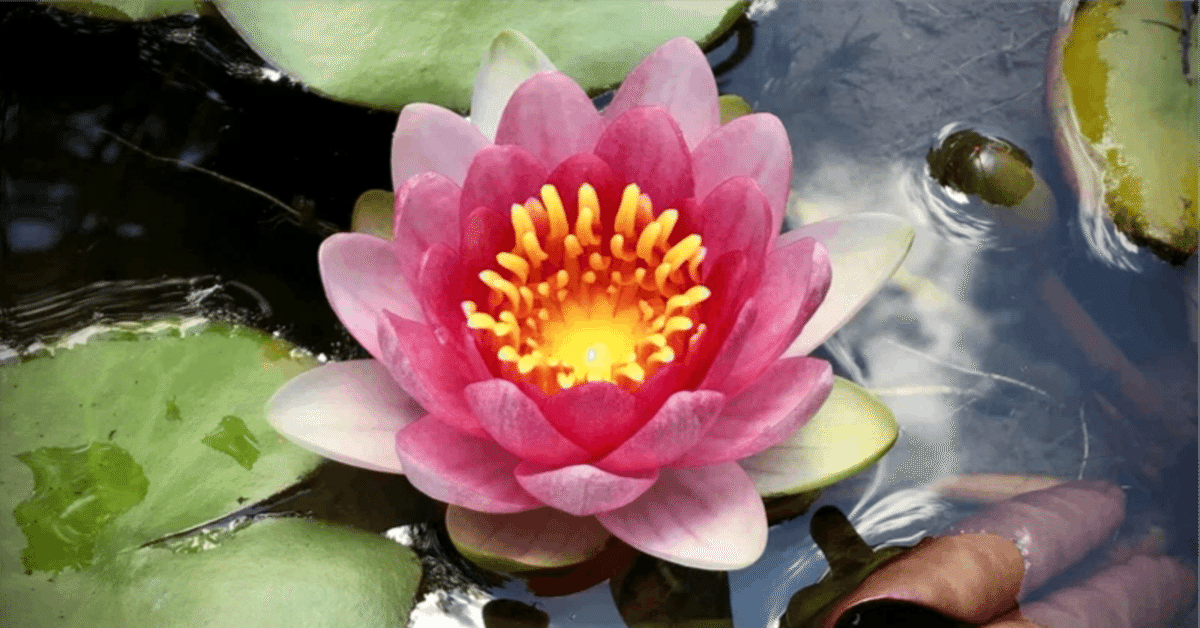
We are in lotus(June. 2024)
When the rainy season comes, I am reminded of the times I frequently visited Kudaka Island in Okinawa. During my few days' stay on the island, I always felt a bit disappointed when it rained. One day, as it started to drizzle and I was feeling down, Yoko Fukuji, standing next to me, said, "It's 'yugafu' rain." "Yugafu" is an Okinawan word meaning "abundance," so she was saying, "It's abundant rain." It is rain that nourishes the plants and the land. I thought it was a wonderful expression.
Since coming to the temple and working in the fields with the abbot, rain became a necessity thing. Especially, the rain that falls after planting seeds is a welcome rain. Recently, there have been many water-related disasters like floods, so I can't always rejoice unreservedly. However, there are many times when I find peace and beauty in the moistened moss and forests. I wish to spend my days in gratitude for my relationship with the rain.
Every time it rains, the vegetables grow, but so do the weeds. During this season, when I meet the neighboring temples at some ceremonies, we are talking about the weed trimmers. While it's challenging to maintain the entire spacious temple grounds perfectly, it's a valuable time to share information on how to effectively balance physical effort and electric tools to ensure the grounds remain well-maintained and allow for refreshing breezes to pass through.
It is said that besides cleaning the temple include own garden, it is important to always arrange flowers, scrolls, and preparing tea so that they are ready for anyone who visits at any time.
We change scrolls according to the seasons, but if there's a scroll with a meaningful connection that would please our guests, we switch it out. As for tea accompaniments, we sometimes prepare local fruits or seasonal sweets, but Shinshu (Nagano Prefecture) is renowned for its pickling culture. In winter, we pickle nozawana, and in summer, we pickle summer vegetables from our garden in salted rice malt or sake lees.
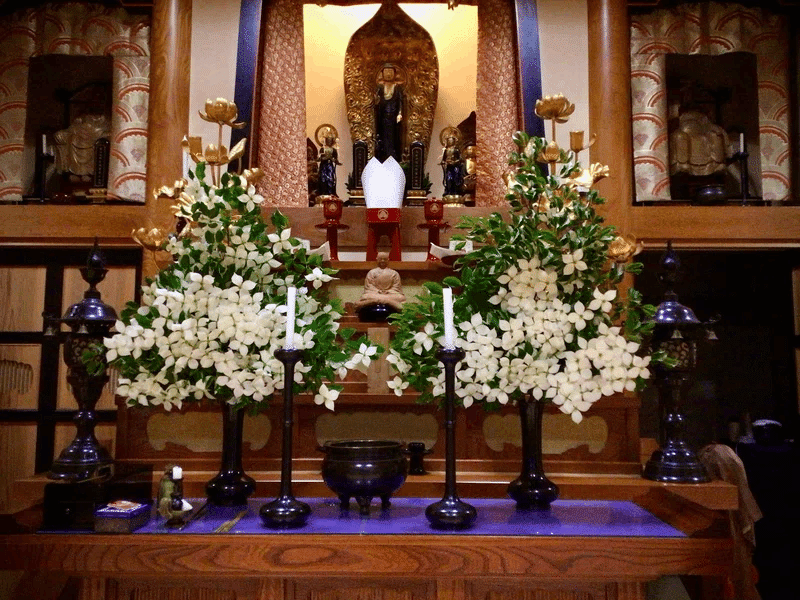
The most challenging aspect for me right now is arranging flowers. I must always take care of the flowers on the altar, in the guest room, and at the entrance. Rev.Joko, the Vice Abbot, used to be owner at a flower shop before becoming a monk, so she knows not only how to arrange flowers but also how to choose them when purchasing from a florist and how to choose and cut them from the temple garden. For mums, she selects thick stems whenever possible and prefers those freshly shipped before soaking to avoid wilting prematurely. For carnations, she cuts them in the air, since they absorb water easily. Flowers also dislike wind, so it's important to close doors and windows to avoid exposing them to wind. In her hometown of Nagasaki Prefecture, there's a proverb: "The punishment for not cleaning up is worse than the punishment for not putting up flowers,". It is important to offer flowers, it is more important not to leave wilted flowers untouched.
When arranging multiple types of flowers in a vase, not all flowers wilt or scatter at the same time. In such cases, it's important to remove the withered flowers and rearrange the remaining ones. Even when busy, there's a tendency to procrastinate or feel attached to the arrangement, making it hard to tidy up. However, if unable to follow up with maintenance later, it might be better not to arrange them at all.
When I was a university student and traveled to Yakushima island in Kagoshima prefecture, the ferry arrived at the port in the early morning, and I walked to meet my friends at our meeting point. Along the way, my feet stopped at a graveyard, where I took the beautiful scenery in a photograph. The graveyard is not narrow, however every flower adorning the graves was stunning. I happened to meet a local resident there and asked, "It's not during the equinox or Obon festival, but why are all the flowers on the graves so fresh and beautiful?" They kindly explained that it's a local custom to pick fresh garden flowers every morning and rearrange them. This made me reflect on myself, realizing I hadn't been paying such respects to my own ancestors.
In May, when the peonies"Botan" bloom in our garden, Rev. Shundo Aoyama said, "Just by adding one dying branch to the living flowers, they gain a elegance." She also said, "Even in death, it can still be useful. I aspire to be like that." "Botan" last for about three days if well maintained, but on hot days, it may bloom and scatter within just one day. Flowers like "Botan" or summer hibiscus require daily rearranging due to their fleeting nature as one-day flowers.
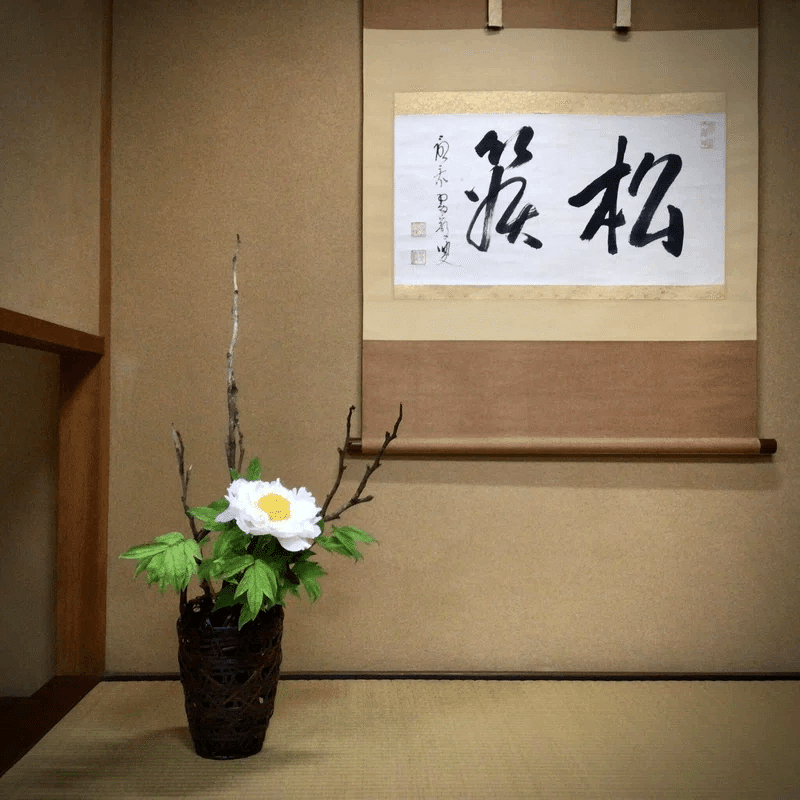
On June 30th, the "Noragi Chakai" (casual tea ceremony) was held for the first time in five years. Due to the COVID-19 pandemic, all events and ceremonies had been canceled or scaled down for the past four years. While tea ceremony practices continued, experiencing the "Nora-gi Chakai" was a first for me. With fewer students in recent years, the tea gathering changed from three sessions to two. Also we used to make 'Tenshin (simple meal eaten before tea is served 点心)' by hand, but this time we outsourced it.
Ticket production and distribution began in May, followed by continuous tasks such as cleaning the garden from early June, selecting tea tools and sweets for the event day, and preparing the documents. One week before the event, students gathered daily weeding the garden, wipe glasses, set up the rooms, and practices.
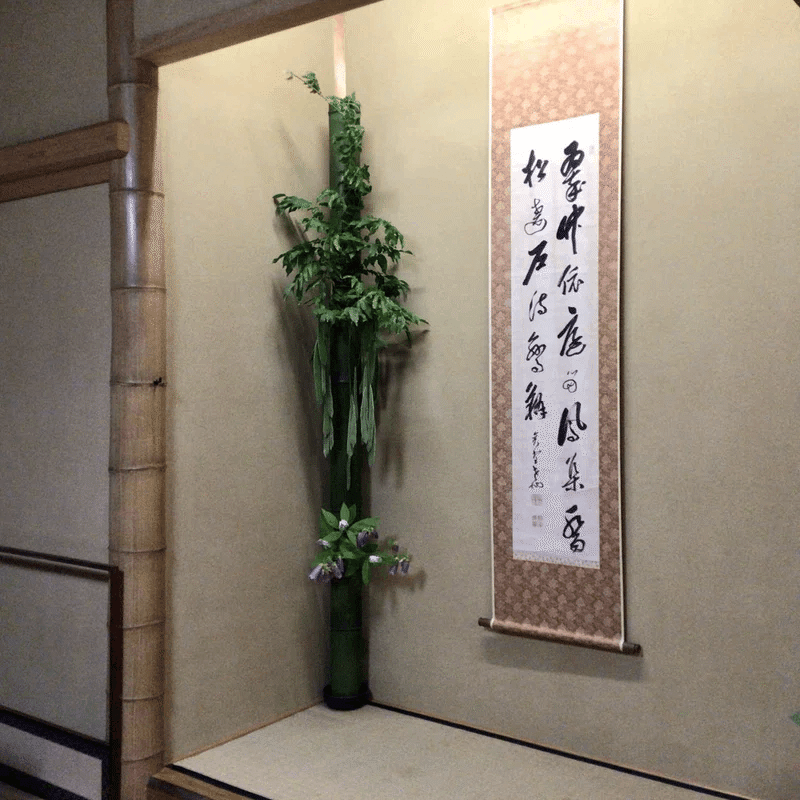
Main room's tokonoma (alcove where art or flowers are displayed), it was hanged this roll, "翠竹依庭留鳳集,喬松繞户待鸞翔" ("Green bamboo in the garden holds gatherings of phoenixes, tall pine trees around the house await the flight of phoenixes"). Rev. Shundo Aoyama choose the green fresh banboo for the flower vase, and she arranged some wisteria seeds, Lysimachia clethroides "toranoo" and Campanula punctata "hotarubukuro". Both bamboo and pine are known as the "Four Gentlemen," symbols of integrity. Phoenixes symbolize exceptional talents gathering in places of integrity.
For five hours, Rev. Shundo seated at the main tea room, explaining and greeting for guests. The guests were delighted to meet her.
She returned to this temple from Tokyo when she was thirties, and established a tea ceremony class and has continued it for over fifty years. We are looking forward to next year, too.
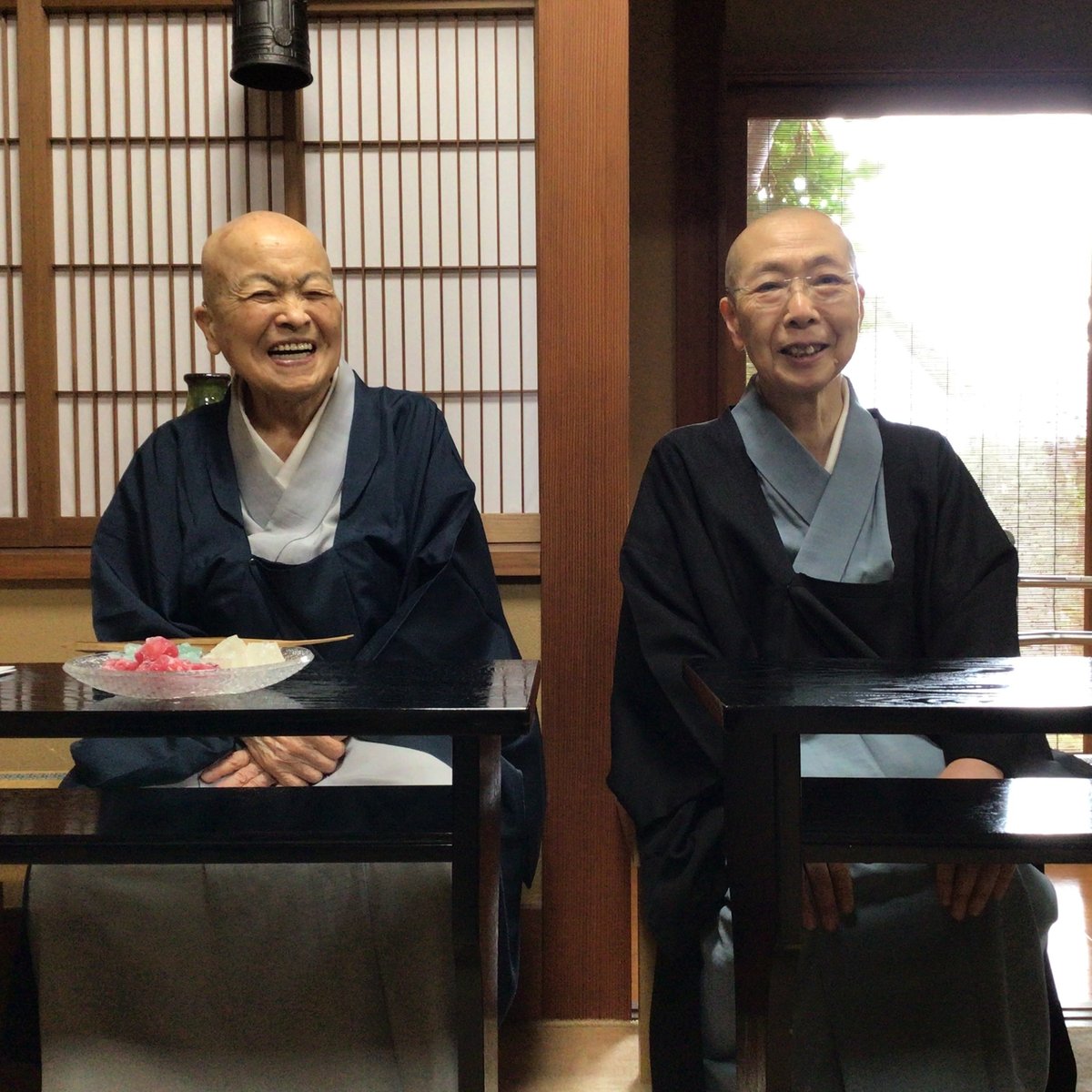
It is already July, Soba fields are in full bloom with white flowers. We have to prepare for the Obon, and it will hold the big event of Zazenkai in August 24th and 25th.
It's season to hear of cicadas voice. Please take care to avoid heatstroke and stay safe during this summer.
いつも心温まるお気持ちをありがとうございます。 頂戴しましたサポートは真実に仏法のために使わせていただきます。引き続きご支援のほど宜しくお願い致します。
